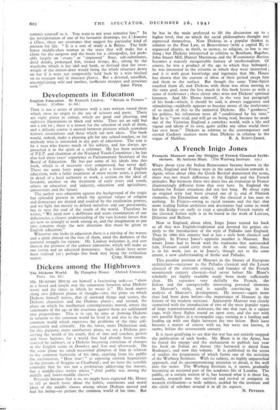Dickens among the Highbrows
MR. HUMPHRY HOUSE set himself a fascinating task—to " show in a broad and simple way the connexion between what Dickens wrote and the times in which he wrote it." His book moves along two different planes of thought—one, the plane on which Dickens himself moves, that of outward things and scenes, the
Dickens characters and the Dickens places ; and second, the plane on which his intellectual contemporaries moved, where the sentiments of the age or the reactions against them are sublimated into propositions. This is to say, he aims at showing Dickens in relation to the common world he lived in and also to the un- common world which expresses the problems of the time self- consciously and critically. On the lower, more Dickensian and, for this purpose, more satisfactory plane, we see a Dickens pre- serving the world of his youth, that of inns and coaches, gaiters and brass buttons, for a world that had already been revolu- tionised by railways, or a Dickens becoming conscious of changes in the English scene in Dombey and Son and afterwards. On the same plane we catch occasional glimpses of him in relation to the common humanity of his time, exacting from his public the exclamation, " How true! " or exposing current hypocrisies in the persons of Stiggins or Chadband ; and we have the sensible reminder that he was not a proletarian addressing the masses, but a middle-class writer whose " chief public was among the middle and lower-middle classes."
Precisely because that is so, we might have expected Mr. House to tell us much more about the habits, sentiments and moral ideas of the middle classes among whom Dickens moved and had his being—to picture the common world of his time. But he has in the main preferred to lift the discussion up to a higher level, that on which the social philosophers thought and expressed themselves. Now Dickens as a popular thinker in relation to the Poor Law, to Benevolence (with a capital B), to organised charity, to thrift, to money, to religion, to law is one thing ; but Dickens interpreted in relation to Bentham, Bagehot, John Stuart Mill, Harriet Martineau and the Westminster Review becomes a scarcely recognisable fantasy of intellectualism. Of course, he was a product of the age to which they belonged ; he was interested in the reforms in which they were interested ; and it is with great knowledge and ingenuity that Mr. House has shown that the current of ideas of their period swept him and them to the surface. But though the same Time-Spirit touched them all, and Dickens with them was often moving to the same goal, none the less much in this book leaves us with a sense of irrelevance ; these clever ones were not Dickens' spiritual kinsmen. And Mr. House himself, in the very last paragraph of his book—which, it should be said, is always suggestive and stimulating—suddenly appears to become aware of the irrelevance of so much of this to the immortal Dickens. His " goodness," his politics, his reformism were all " conditioned by his time." But he is " now read, and will go on being read, because he made out of the Victorian England a. complete world, with a life and vigour and idiom of its own, quite unlike any other world there has ever been." Dickens in relation to the contemporary and eternal Cockney matters more than Dickens in relation to the






















 Previous page
Previous page